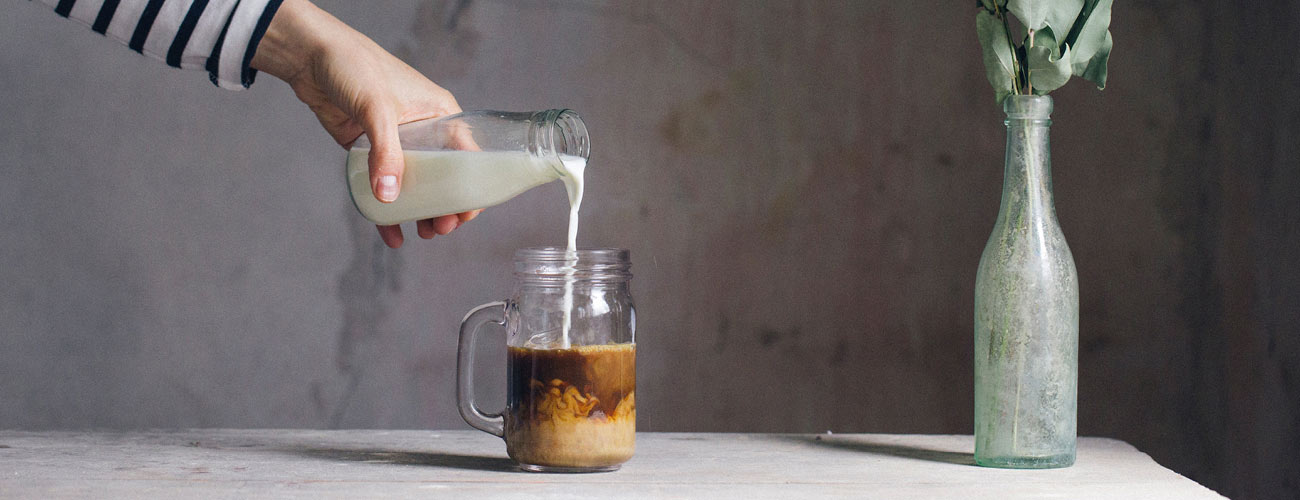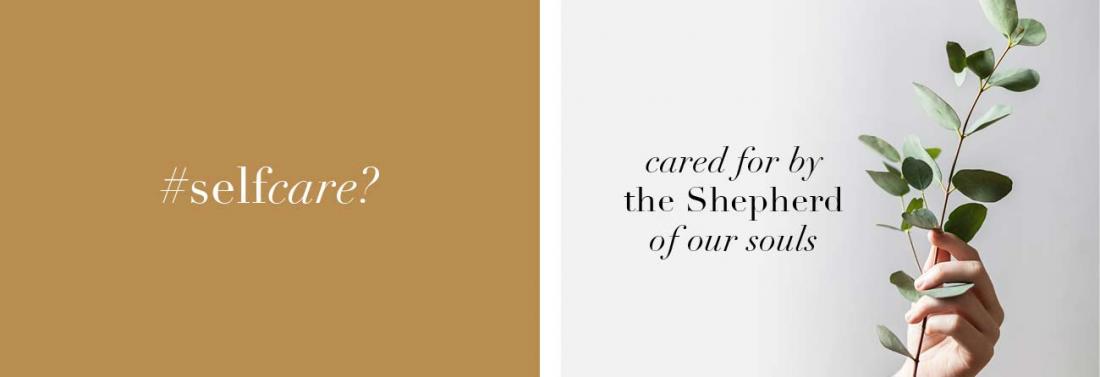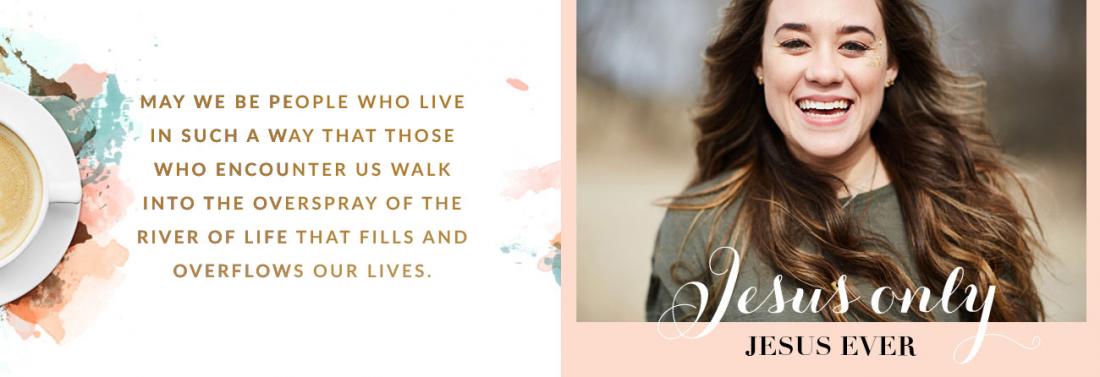A Biblical Take on the Self-Care Movement
By MANDY SAELER

I poured the hot, bubbling water over the tea bag and wrapped the string around the handle of the mug. As I did, I turned the tag to read the small words printed on one side: “In the beginning is you, in the middle is you, and in the end is you.” This tea tag seemed to have a very high estimation of me and I couldn’t help but raise my eyebrows with skepticism as I read the words. A Scripture that seemed to echo the same sentiment, but in view of God, streamed through my mind, “I am the Alpha and the Omega, the first and the last, the beginning and the end” (Rev. 22:13 ESV). Undoubtedly, this grand statement on the tea bag was a better estimation of God than it was of me.
That simple life-moment of brewing tea in my little white kitchen spoke something significant to my heart. It was a fresh and sobering picture of the message that our world promotes through many popular messages today. And that message, in its simplest form, is that it’s all about you.
It is this same message of self-importance and supreme self-worth that our world promotes through its various movements, marches, and diversions. Though it may be creatively disguised here and there, the age-old whisper of the serpent echoes into our present day, “You can be like God.” (See Genesis 3.)
In this article, I specifically want to take a look at a trending hot topic in our day: self-care. Self-care isn’t a new-fangled idea, but it has gained popular attention and become a catchphrase in our day, especially in the social media world with the trending #selfcare.
The term is often used for a wide range of personal care processes — whether it be practically taking care of yourself by showering daily and tending to your physical health by addressing high blood pressure through diet and exercise, or indulging yourself with the things that make you feel good — like binge-watching reruns of The Bachelorette on Netflix, escaping the realities of life in bubbly bathwater with a glass of wine, and the like.
“Quality You-Time” is how it is commonly described — a gentle reminder for us to “take care of ourselves.” The general idea of self-care has been likened to the instructions we receive each time we board an aircraft and buckle our seatbelt for take-off. In the event that the cabin pressure should decrease and the oxygen masks drop, we are to secure our own oxygen mask before assisting others. And this is also the essence of the self-care message — love yourself first so you can then love others.
A Christian young woman I know recently shared her confusion about self-care: What does it really mean, when does it go too far, and how are we supposed to interact with this notion as women of God? I understood why she felt confused — this is a very muddled topic. The broad term blends practical, responsible living (like personal hygiene) together with self-indulgence (like hinging emotional survival on X, Y, and Z) together into one soft-sounding concept: self-care.
It is confusing. As believers, we understand and agree that we should take care of our bodies, inside and out. Yet, for many of us, it is the self-indulgent expression of self-care that leaves us unsettled as it seems to directly contrast Jesus’ call to deny ourselves, take up our cross, and follow Him. (See Matthew 16:24-26.) As we explore the hot topic of self-care and lay out the straight edge of God’s Word next to it, my sincere hope is that we would gain clarity and understanding where there is confusion or uncertainty. And more than just that, I hope that this will lead you to seek refreshment and strength in God, who gives us “drink from the river of [His] pleasures. For with [Him] is the fountain of life…” (Ps. 36:8-9).

Returning To Eden
In order to get to the root of the self-care issue in our day, we are going to go all the way back to the beginning to the Garden of Eden: the truest taste of Heaven on earth there ever was. We are going to reflect on that pivotal moment in world history when Eve heeded the words of the serpent, and then we will fast-forward to our world today. (Spoiler Alert: We might just discover that the same age-old deception is what is still being presented to us today.)
FREE WILL
In the beginning: It was free will that allowed Eve to raise her hand to disobey God and lay hold on the forbidden fruit that the serpent convinced her would make her like God. (See Genesis 3.)
In our world today: It is free will that allows us to live the way we want to — whether in acknowledgment of God or according to our own preference.
DOUBT
In the beginning: It was doubt that hatched in Eve’s heart when she listened to the serpent’s lie, “You will not surely die … you will be like God…” (Gen. 3:4-5). She doubted God, believing that His words weren’t true and that He was withholding something good from her.
In our world today: It is doubt towards God and His truth that resides in the hearts of modern women as new renditions of the age-old deception: You can be like God, you determine what is good and right for you, it’s all about you, do what makes you happy, love yourself first.
CONVINCED OF THE LIE
In the beginning: “So when the woman saw that the tree was good for food, that it was pleasant to the eyes, and a tree desirable to make one wise, she took of its fruit and ate…” (Gen. 3:6).
Eve heeded the lie, reached for the fruit, bit in, and sin entered the world. From that moment on the world has been a broken place.
In our world today: So when the woman saw that the world’s wisdom was palatable to her senses, that it was pleasant to her inclinations, and was a wisdom desirable to make her of central importance and furnished for a happy life, she took of its fruit and ate… (A modern parallel to Eve’s deception in Genesis 3.)
Over and over again, in the Garden of Eden then and in the quiet recesses of our hearts today, it’s the same old lie. Though it may be creatively repackaged and disguised from one generation to the next, the lie remains the same: YOU can be as God. God is withholding something from you. You can find life and happiness in your own way.
The enemy’s agenda was — and is — to steal, kill, and destroy. That’s what he did in the Garden and his agenda remains the same in the lives of men and women today. His doubt-inducing lies brought death and destruction into the world, but the great and glorious truth is that God is the same yesterday, today, and forever. God desires abundant life and intimate relationship with His people. So much so, that while we were yet sinners, God sent His only Beloved Son to be an offering for sin and to remove the veil of separation that was placed between God and man as a result of the rebellion in Eden.
Jesus opened the Way of Life, offering restored relationship with God, all the beauties of redemption, the forgiveness of sin, unmerited mercy, grace upon grace, His life-giving Word, the bright hope of an eternal home in Heaven, the joy of His Spirit alive in us, authority in His name, and freedom from the lies of the devil and the reigning lust of our inherent sinful nature. And He gives us life — true and abundant life.
When we recognize the glorious measure of what our God has done for us, and the true life He offers to us, why would we heed to the age-old whisper of the serpent?

What is Filling Your cup?
A popular self-care quote appeals to our practical and emotional sensibilities, saying, “You can’t pour out from an empty cup.” Very likely, we can all relate to the feeling of dryness, weariness, and need for refreshment…
The solution offered today? Self-care. In essence, self-care is prioritizing quality you-time; loving yourself first so you can love others; and filling your cup by taking care of you first — then you can pour out.
When we look at Scripture, we see a different pattern for having not just a full cup — but an overflowing one. A solution that is found in being cared for by the Shepherd of our souls.
Here is a short list of truths and Scriptures to ponder:
• God is my Shepherd and I have no lack. He restores my soul, He leads me in paths of righteousness, and He is with me. He anoints my head with oil and my cup runs over. (See Psalm 23.)
• The knowledge of God’s love for me, His faithful care for me, and His desire for me refreshes and strengthens my heart. (See Song of Solomon 2:10-14, Jeremiah 31:3, 1 John 3:1; 4:19, Zephaniah 3:17, and Isaiah 61.)
• Like Jesus modeled in His earthly life, I will find true refreshment and strength for daily life in God’s presence. (See Matthew 14:23, Mark 1:35, and Luke 5:15-16.)
• As I surrender my life to Jesus, I will discover the deep joy of living for Him. I willingly offer up my body as a living sacrifice and choose, by God’s grace, not to conform to the pattern of this world. I will practice thinking of myself with sober judgment and bear Christ’s mind as I esteem others as higher than myself. (See Romans 12:1-3 and Philippians 2:3-8.)
• As I bring blessing and refreshment to others, I myself will be blessed and refreshed. It is better to give than to receive. (See Proverbs 11:24 and Acts 20:35.)
• My hope is not in wealth or earthly treasure, but my hope is in God who gives us all things richly to enjoy. I am called to be rich in good deeds and lay up treasure in Heaven. (See 1 Timothy 6:17-19.)
• Blessing and provision will flow into my life as I seek first His Kingdom and righteousness. (See Matthew 6:24-34.)
• In His presence is the fullness of all joy and in Jesus is the truest pleasure! (See Psalm 16:11.)
• When I bring my thirst and emptiness to Jesus, He fills me and makes my life overflow:
“…Jesus stood and cried out, saying, ‘If anyone thirsts, let him come to Me and drink. He who believes in Me, as the Scripture has said, out of his heart will flow rivers of living water’” (Jn. 7:37-38).
As we live in this dry and broken world, the question stands for you and I — what is filling our cup and quenching our thirst? What is fueling us as we live our daily lives? Will living in accordance to this world’s philosophies enable us to live the lives of godliness we are called to?

On a Practical Note
When Jesus has first place in our lives and is the One filling our cup to overflowing, taking care of ourselves in a balanced and moderate way will be a natural outflow of living unto Jesus. When it comes to practically caring for ourselves and living our lives, I would encourage you to not allow the self-care lingo of our day to confuse you or overcomplicate what is good, necessary, and even enjoyable. Do take care of yourself — and do so in a God-honoring way. And when the time comes for enjoying the “extra pleasures” of life, with your heart settled in Jesus, you will be able to freely, richly enjoy them as a gift from His hand! Rest in the reassuring comfort that when Jesus is truly at the center of our lives, He will lead us in the liberty of His Way, His Truth, and His Life.
So, take a shower, get dressed, and do your hair; go for a walk in the fresh air and take joy in the bird’s song; laugh heartily and love the people around you; carve out time for godly refreshment and rest … and live. May we be people who live in such a way that those who encounter us walk into the overspray of the river of life that fills and overflows our lives.
The Posture of the Heart
Oswald Chambers was a man of incredible spiritual depth, passion for God, and uncompromising love for truth. He was a spiritual man who had a contagious zeal for living life — and it was his rich and devoted love for Jesus that freed him to enjoy all of life with a heavenward heart. He experienced great beauty, pleasure, refreshment, and enjoyment in the things of life — like his appreciation of nature and masterful music, his delight in children and his beloved daughter, and his passion for speaking powerful truth to needy souls. All because Jesus had first place in his life.
As Oswald Chambers’ life exemplifies, when the posture of our heart is towards Jesus and He is our First Love — the very living of life is shifted from black and white to full color. Early on in his Christian life, when he awakened to the infinite love of God and His Spirit filled him, he described it in this way, “Glory be to God, the last aching abyss of the human heart is filled to overflowing with the love of God. Love is the beginning, love is the middle, and love is the end. After He comes in, all you see is ‘Jesus only, Jesus ever.’”
As we encounter the world’s messages — In the beginning is you, in the middle is you, and in the end is you… You can’t pour out from an empty cup… Do what makes you happy — may we be mindful that the age-old deception of the serpent still permeates our day. Rather than heeding the lie, may we live in realities purchased for us through the sacrifice of our Savior. (See 1 Peter 4:1-6.)
May the love of Jesus so fill and overflow our lives that when worldly philosophies are presented, there isn’t an ounce of space for them in our cup. And as the onlooking world observes our lives, may their thirst arise as they behold the overflowing essence of the One who floods our cup with His love … for, “Love is the beginning, love is the middle, and love is the end. After He comes in, all you see is ‘Jesus only, Jesus ever.’”